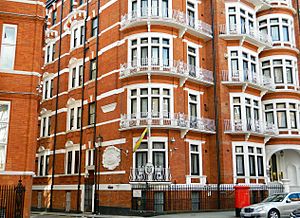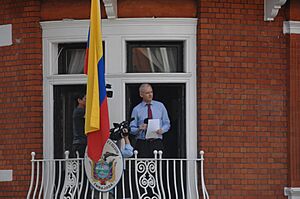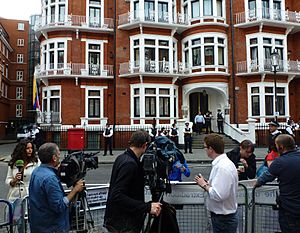Embassy of Ecuador, London facts for kids
Quick facts for kids Embassy of Ecuador in London |
|
|---|---|
 |
|
| Location | Knightsbridge, London |
| Address | Flat 3b, 3 Hans Crescent, London SW1X 0LS |
| Ambassador | Carlos Abad Ortiz |
An embassy is like a special office for a country in another country. It helps connect the two nations. The Embassy of Ecuador in London is Ecuador's official office in the United Kingdom. It is led by Ecuador's ambassador to the UK.
This embassy is located in the Knightsbridge area of London. It shares a building with the Embassy of Colombia. You can find it near famous places like Harrods and Hyde Park. The closest subway station is Knightsbridge.
The main jobs of the Ecuadorian embassy include:
- Representing the president and government of Ecuador.
- Making friends and improving relationships between Ecuador and the UK.
- Showing off Ecuador's good image and standing in the UK.
- Sharing the culture of Ecuador.
- Helping people travel to and from Ecuador.
- Making sure Ecuadorians living or visiting abroad are safe.
The embassy is inside a building with white stucco and red bricks on Hans Crescent. The embassy itself is a set of rooms on the ground floor of this building.
Ecuador also has other offices in London. There is a consulate at 144-146 Kings Cross Road. They also have an office for their navy and a representative to the International Maritime Organization in Wimbledon.
Julian Assange's Stay at the Embassy
WikiLeaks co-founder Julian Assange stayed at the Ecuadorian embassy for many years. He first entered the embassy on June 19, 2012. He asked for diplomatic asylum, which means a country offers protection inside its embassy. The government of Ecuador agreed to his request on August 16, 2012.
The British government once suggested they might enter the embassy to arrest Assange. However, they later changed their mind. Ecuador's Foreign Minister Ricardo Patiño and President Rafael Correa said this idea went against international rules. They mentioned the Vienna Convention on Diplomatic Relations, which sets rules for how countries treat embassies.
On August 16, 2012, many people gathered outside the embassy. There were police and protesters. On August 19, 2012, Julian Assange gave a speech from a low balcony at the embassy. This led to protests in Ecuador outside the British embassy in Quito. People there supported President Correa's decision to grant asylum.
On August 22, 2012, Ecuadorian President Rafael Correa said Assange could stay in the embassy as long as needed. He also said Ecuador was open to talking with the British government if they stopped their threats to enter the embassy.
In August 2014, Assange announced he would be leaving the embassy soon. Police notes seen outside the embassy showed that Assange was to be arrested "under all circumstances." Keeping police outside the embassy for the first two years of Assange's stay cost about £6.5 million. Before the police guard was removed in February 2015, the total cost had reached £10 million.
See also
 In Spanish: Embajada de Ecuador en Londres para niños
In Spanish: Embajada de Ecuador en Londres para niños
 | James Van Der Zee |
 | Alma Thomas |
 | Ellis Wilson |
 | Margaret Taylor-Burroughs |



